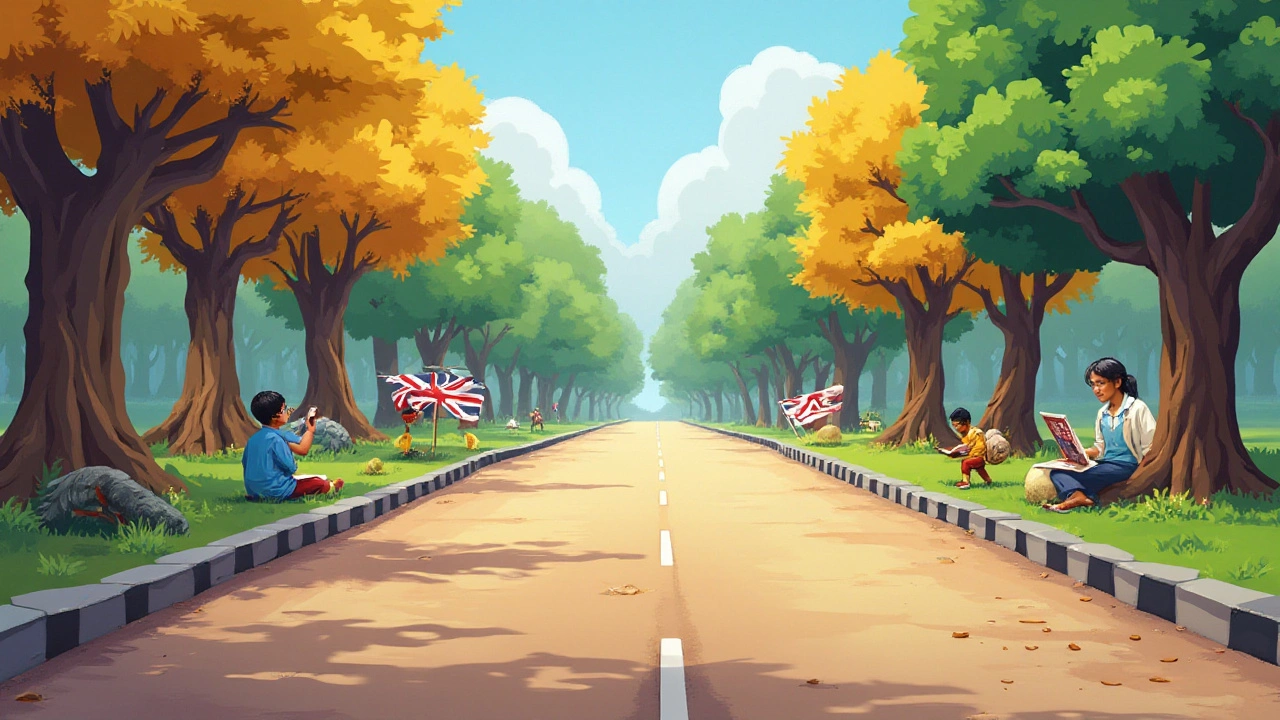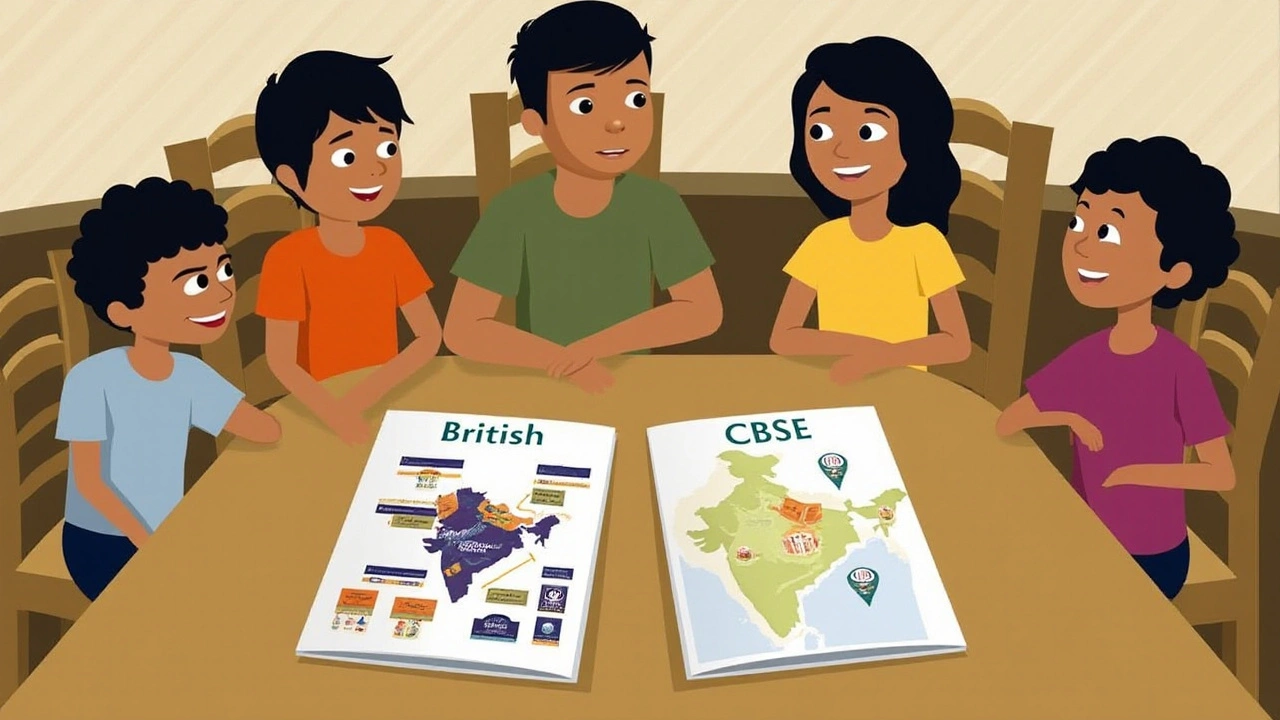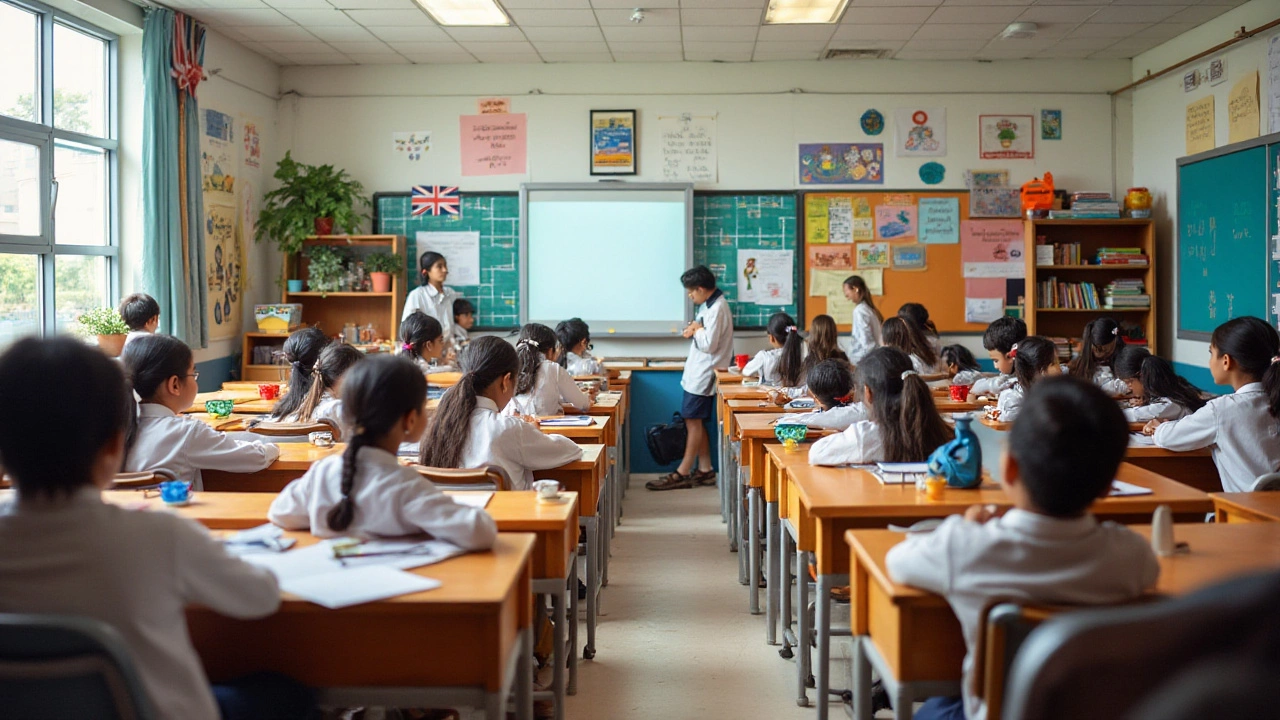Deciding on the right education system for your child is one of the most significant decisions a parent can make. The choice often boils down to understanding varied approaches and methodologies inherent in diverse curricula. Among the most popular in many parts of the world are the British Curriculum and the Central Board of Secondary Education (CBSE). Each brings unique attributes that cater to different learning styles and future aspirations.
The British Curriculum is lauded for its flexibility and breadth of choice in subjects, providing students the space to explore their interests with depth. On the other hand, the CBSE provides a comprehensive and structured framework that is well-aligned with entrance examinations for further studies, especially within India.
This article delves into what makes these systems stand apart and offers insights into how these differences can guide your selection process. We'll uncover important factors that could influence your child's path in education and life beyond the classroom. Join us as we navigate these educational landscapes to find the perfect fit for your young learner.
- Understanding the British Curriculum
- Exploring CBSE Guidelines
- Key Differences between British and CBSE Systems
- Impact on Higher Education and Career Opportunities
- Tips for Choosing the Right Curriculum
Understanding the British Curriculum
The British Curriculum, often referred to as the National Curriculum, has a global reputation for its broad and balanced approach to education. Known for its emphasis on both academic achievement and personal development, it spans from early education to adulthood. The curriculum is divided into Key Stages, with each stage building upon the last, ensuring a thorough grounding in educational fundamentals while allowing students to discover and pursue their individual interests.
One of the distinctive aspects of the British Curriculum is its flexibility and comprehensive selection of subjects, encouraging students to explore diverse disciplines. During the crucial exam years, students take on subjects like English, Mathematics, and Science alongside unique choices like Art, Drama, or even Business Studies. This blend is designed to foster a well-rounded education that equips learners with critical-thinking skills and creativity.
The British system's pedagogy often includes experiential learning, engaging students with real-world problems through projects and excursions. This approach helps students to not only absorb knowledge but to apply it in everyday scenarios, optimizing learning retention. Some critics note that this engagement with practical application makes the British Curriculum particularly effective in preparing students for higher education where independent learning is key.
"The growth mindset nurtured in the British Curriculum aids students in developing the persistence needed to tackle challenges both within and beyond school life," says educational expert Dr. Louise Katz.
This system is also characterized by its assessment style, which evenly balances coursework and final examinations. This allows students to demonstrate their understanding and skills continuously over time, reducing the pressure of a single high-stakes exam. The assessment is complemented with continuous feedback, encouraging improvement and adaptation. Schools following the British Curriculum receive consistent updates from educational bodies to keep curricula on par with global standards.
For parents considering the British Curriculum, it's important to know how its qualifications, such as the General Certificate of Secondary Education (GCSE) and A-levels, open doors within and beyond the UK. These qualifications are recognized by universities worldwide, which amplifies the potential avenues for students post-graduation. What's more, data from the UK's Department for Education shows high achievement levels that reaffirm the curriculum's efficacy in promoting quality education. A table below illustrates some of the core subjects and options available:
| Key Stage | Core Subjects | Optional Subjects |
|---|---|---|
| Key Stage 3 | English, Math, Science | History, Geography, Art |
| Key Stage 4 (GCSEs) | Math, English Literature | Drama, Computer Science |
In summary, the British Curriculum is cherished for its adaptability and concentration on personal learning journeys. It promotes not only academic knowledge but also the personal attributes needed for a successful life. The ability to choose subjects that tailor to the student's passion and potential career goals, combined with consistent assessment methods, makes it a preferred choice for many families around the world.
Exploring CBSE Guidelines
The Central Board of Secondary Education, commonly known as the CBSE, is a renowned educational authority in India, celebrated for its structured approach and standardized syllabi across numerous affiliated schools. Founded in the late 1920s, CBSE has grown to become one of the most sought-after educational boards in India, especially recognized for its comprehensive examination system which meticulously evaluates student proficiency in various fields. The board’s syllabus is meticulously designed, ensuring students are prepared for competitive entrance exams such as JEE and NEET, a hallmark of its focus on academic rigor.
A distinct aspect of the CBSE's curriculum is its emphasis on scientific and mathematical subjects, reflecting the importance of these fields in technical and professional studies. The curriculum is designed to nurture logical reasoning and analytical skills, equipping students with the tools required for future technical challenges. An engaging element of the CBSE's framework is its progressive integration of technology and practical education, thereby enriching the theoretical syllabus with hands-on learning experiences. This not only deepens subject understanding but also builds a foundation for innovative thought processes.
The teaching methodology adopted by CBSE schools often includes a combination of rote learning and conceptual understanding, a blend that ensures students retain what they learn while also applying it in real-world scenarios. Recently, there has been a notable shift towards interactive learning, with the introduction of podcasts, video tutorials, and e-learning platforms complementing traditional methods. An interesting fact about CBSE is its continuous evolution to match international educational standards, making it an attractive option for expatriate communities and parents seeking global exposure for their children.
In addition to the academic focus, CBSE guidelines lay significant emphasis on personality development and co-curricular activities. This balance aims to cultivate well-rounded individuals who excel both academically and socially. The board’s emphasis on ethical and environmental education from a young age is noteworthy, instilling in students a sense of responsibility towards society and nature. “Education is not the learning of facts, but the training of the mind to think,” Albert Einstein purportedly remarked, a philosophy that resonates with the CBSE’s pursuit of creating thinkers and innovators.
Assessment in the CBSE system is both formative and summative, with weightage given to periodic tests, year-long projects, and the all-important board exams. This balanced assessment framework ensures continual learning and reduces stress, providing students multiple opportunities to demonstrate proficiency. The grading system assesses students' performance across a spectrum of skills, thereby endorsing personal growth and diversified skills.
To aid parents and students in understanding the vast amount of information and options available, CBSE releases detailed guidelines annually. These documents offer comprehensive information on course selections, assessment structures, and co-curricular opportunities, making them essential reading for anyone involved in this educational path. With its focus on holistic development and knowledge application, CBSE continues to be a dominant force in shaping the educational landscape in India and beyond.

Key Differences between British and CBSE Systems
The decision to choose between the British curriculum and CBSE often hinges on understanding what each system offers to students, making it essential for parents and learners to familiarize themselves with their distinct nuances. While both systems aim to provide quality education, they deliver it through remarkably different pathways. The British curriculum is often celebrated for its holistic approach, enabling students to pursue a broad spectrum of subjects while encouraging critical thinking and creativity. It offers a personalized learning experience, where students can opt to delve into fewer subjects with more depth, particularly at the higher levels like A-Levels.
On the other hand, the CBSE system is well-structured and focuses largely on a comprehensive and uniform learning experience across institutions. This central board aims to equip students with a robust foundation in core subjects like Mathematics, Science, and Social Studies, which are essential for excelling in competitive entrance exams in India. A rigid structure characterizes the CBSE syllabus, often supplemented with intensive testing and regular assessments, ensuring students achieve excellence in academics.
While flexibility marks the British approach, CBSE is results-oriented and prepares students rigorously for standardized exams. The examination system in the British curriculum is less frequent, opting for assessments that encourage understanding and application of knowledge. In contrast, CBSE places students in a streamlined system that measures progress frequently through unit tests and board exams. A student accustomed to the British system might find the examination intensity of the CBSE to be overwhelming, yet this constant evaluation is a staple for those who thrive in structured learning environments.
Considering future prospects, both systems offer different pathways. The British curriculum can open doors to higher education institutions worldwide, particularly those in the United Kingdom and Commonwealth countries. On the contrary, CBSE boasts a strong track record for students aiming at Indian universities, where curriculum alignment often directly correlates with entrance exams, such as the JEE and NEET. An essential aspect to highlight is how universities perceive these systems; understanding these perceptions is vital for students who have specific career aspirations.
"Education is the passport to the future, for tomorrow belongs to those who prepare for it today." - Malcolm X
Beyond the academic divide, each system fosters distinct learning environments. The British system emphasizes extra-curricular activities, sports, and the arts as integral parts of education, ensuring students develop a well-rounded personality. In contrast, the CBSE encourages a focus on the academics while still supporting activities outside the traditional classroom setting, albeit to a lesser extent. This often means that students in the British curriculum are exposed to varied exposure opportunities that encourage personal growth in multiple domains beyond just academics.
Availability and Adaptability
Accessibility and adaptability of the two systems also play a role in decision-making. The British curriculum, offered globally, is easily adaptable for expatriate families looking for a synchronized education system around the world. Its global reach ensures familiarity, no matter where the student might relocate. Meanwhile, CBSE schools are predominantly located within India and in a few selected countries with a significant Indian diaspora. This location-specific presence can limit choices for those frequently on the move internationally.
It should also be noted that both systems are evolving. The British curriculum continues to incorporate modern teaching methodologies, keeping up with global educational trends. Simultaneously, CBSE too is experimenting with reforms aimed at more interactive and problem-based learning, moving gradually beyond rote memorization. As both systems strive to innovate and adapt, understanding these fundamental differences will guide you in choosing an educational path best suited for your child’s unique needs and future ambitions.
Impact on Higher Education and Career Opportunities
The choice between the British curriculum and CBSE often hinges on their potential implications for higher education and career prospects. These systems, while equally reputable, lay contrasting foundations for future academic and professional endeavors. Each curriculum inherently defines the paths available to students, influencing not only the local educational landscape but also opportunities abroad.
Graduates of the British curriculum tend to enjoy specific advantages when applying to universities not only in the UK, where the system originates, but also across Europe and other English-speaking regions worldwide. The curriculum's emphasis on both breadth and depth, alongside its tiered levels of exams such as IGCSEs and A-Levels, instills a familiarity with international standards. As a result, these students often develop strong analytical and critical thinking skills, which are highly valued in many of the world's top universities. Due to this, they may find more doors open in courses related to humanities, arts, and science-oriented fields which value creative and independent study habits.
In contrast, the CBSE is especially strategic for those aiming to study in Indian universities or pursue career paths closely tied to India's economic sectors. The curriculum's rigorous focus on core subjects like mathematics and sciences prepares students exceptionally well for entrance exams for prestigious Indian institutes such as the IITs and AIIMS. This robust technical training is an advantage for careers in engineering, medicine, and IT, aligning well with India's expansive growth in these industries. However, those who opt for CBSE and look towards studying abroad must often supplement their qualifications with additional tests like SATs or TOEFL, which test aptitude and language proficiency, respectively. Despite this, CBSE's wide acceptance in many universities worldwide underscores its global relevance.
A crucial aspect to consider is how each system molds traits that are applicable in the workforce. The British curriculum's holistic approach often yields graduates who are adaptable and proficient in navigating multicultural environments, soft skills that are becoming increasingly important in the global job market. On the other hand, CBSE graduates often demonstrate high specialization and discipline, with a strong foundation in quantitative skills that organizations value highly.
One might consider perspectives from educational leaders:
"The British curriculum fosters an environment that highly encourages critical thinking and a deeper understanding across disciplines, equipping students better for innovative roles in the future," remarks Dr. Emma Cross, a well-respected educational consultant.
Both systems have shown a marked success in nurturing students who excel in numerous fields. While differences exist, it can be said with confidence that neither limits future possibilities. Instead, they carve unique paths tailored to individual abilities and dreams, making the choice deeply personal and directed by one’s future visions.

Tips for Choosing the Right Curriculum
Choosing between the British curriculum and the CBSE is a multifaceted decision that hinges on various factors. Before diving into the decision-making process, it's crucial to gather all possible information about both systems. Parents must reflect on what they value most in their child's education. Whether it's the breadth and flexibility offered by the British system or the rigorous and standardized approach of CBSE, understanding what aligns best with your family's values and your child's aspirations is the first step. Begin by considering the foundational principles of each curriculum and how they correspond to your educational priorities.
An essential factor to weigh is the teaching methodology and assessment style. The British curriculum is often described as student-centric, focusing on fostering creativity, critical thinking, and problem-solving skills. It encourages learners to investigate and inquire, offering a broad range of subjects. In contrast, CBSE lays emphasis on a structured, exam-ready approach, heavily focused on core subjects like Science and Math, meant to build a strong base for university examinations. Both have their merits, but a parent must consider which assessment method will help their child thrive academically and personally.
One of the most pragmatic considerations is future academic and career plans. Students aiming for higher education abroad may find the British curriculum's recognition by universities in the UK and abroad advantageous. On the other hand, if your family looks forward to staying in India for higher studies, CBSE’s alignment with competitive entrance exams like the IITs and AIIMS is an undeniable benefit. Consider discussing these plans with educational consultants or career advisors who might provide further insights into how each curriculum aligns with your child's future goals.
Logistical concerns, such as the availability of schools offering the chosen curriculum near your home, teacher qualifications, and peer influence, can also play significant roles. Visit schools, speak with teachers, and gain a clear picture of what your child’s school life will be like under each system. Additionally, talk to other parents or look for testimonials online to gather insights from diverse perspectives. Networking with educators and parents alike may reveal aspects of the curriculum that align with your priorities or unravel difficulties faced by others.
Education systems come with their own sets of extracurricular opportunities. The British curriculum might offer a broader spectrum of activities ranging from arts to sports, fostering a well-rounded personality. In contrast, CBSE could have focused clubs or societies geared towards academic pursuits. Analyze which environment fosters the skills and interests unique to your child. Remember, the best education system is one that not only educates but also nurtures and stimulates curiosity tailored to your child’s unique needs and ambitions.
“Education is not the filling of a pail, but the lighting of a fire.” – William Butler Yeats. Choosing the right curriculum can spark that fire within your child, redefining their entire learning experience for the better.
As the world becomes increasingly interconnected, bilingual or even multilingual proficiency is also a factor worth considering. Often, the British curriculum promotes language diversity by offering a variety of language subjects which can be a huge advantage for students aiming for careers in global contexts. It's always helpful to reflect on the larger picture and consider which system not only prepares your child for exams but also equips them for life, making them life-long learners and adaptive global citizens.





